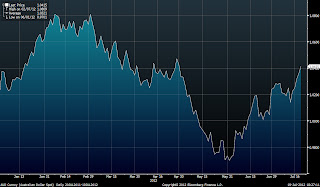Ouch. Trying to short the Aussie dollar in 2012 has been a very painful trade. I thought I was super smart transferring some money to the US just before the latest bout of weakness. Is the Aussie's muscularity a proxy for future growth or central bank diversification? I recall some of my bearish friends telling me they were surprised it had not fallen further when it was in the high 90s a month or so ago. Other smart guys I know have called a big Aussie dollar bubble only to be frustrated by repeated false dawns. The good news about the Aussie is that it should help attenuate future inflationary pressures, for a period of time. We don't want to see a sub-90 cent currency (and start importing inflation rather than the deflation we've benefited from of late). A big drop in the Aussie will likely mean the world is crapping itself. A strong currency increases our purchasing power while helping lubricate structural adjustments that are taking place in any event. And if it rises too far, the RBA will cut rates.
Real-time, stream-of-consciousness insights on financial markets, economics, policy, housing, politics, and anything else that captures my interest. Tweet @cjoye
The author has been described by News Ltd as an "iconoclast", "Svengali", a pollie's "economist muse", and "pungently accurate". Fairfax says he is a "Renaissance man" and "one of Australia’s most respected analysts." Stephen Koukoulas concludes that he is "85% right", and "would make a great Opposition leader." Terry McCrann claims the author thinks "‘nuance’ is a trendy village in the south of France", but can be "scintillating" when he thinks "clearly". The ACTU reckons he’s "an enigma wrapped in a Bloomberg terminal, wrapped in some apparently well-honed abs."
